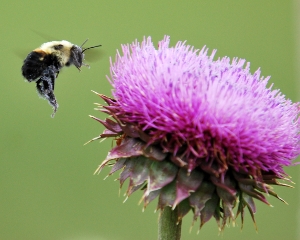Developing New Tools for Comparative Analysis

How does brain mass vary with body mass in a group of species? How does social behavior in insects vary with the number of chromosomes? How do home ranges vary between omnivores and herbivores?
These are the sorts of questions biologists might ask when studying a species. One method of exploring these questions is to build comparative models to analyze data in evolutionary relationships. Phylogenetic comparative methods or PCMs use information on the evolutionary relationships of organisms to compare species.
NIMBioS postdoctoral researcher Dwueng-Chwuan "Tony" Jhwueng designs new PCMs for comparative analysis under non-tree-like or network evolution. A phylogenetic network, rather than a phylogeny or multi-furcated tree, can more accurately conduct comparative analysis among species, according to Jhwueng.
The purpose of Jhwueng's research is to develop PCMs that can be applied to data that cannot sufficiently be explained using traditional models. Specifically, Jhwueng develops PCMs for ancient hybridization events, that is biological events where populations are transformed into new species, and for data that are not normally distributed.
"The purpose of my research is to improve upon traditional comparative methods that do not describe well comparative data in the biological literature and that lack statistical evidence to support biological answers," Jhwueng said.
Originally from Pingtung, Taiwan, Jhwueng hopes his research will ultimately establish a stronger connection between mathematics as a stochastic process and biology in terms of phylogenetic comparative analysis.
"My field of research is a very interesting area because it not only includes development of mathematical theory but also can help answer practical questions that are commonly asked in evolutionary biology," Jhwueng said.
Jhwueng has a Ph.D. in mathematics from Indiana University.
For more information about postdoctoral fellowships and other research and educational opportunities at NIMBioS, visit our website at http://www.nimbios.org.
#
The National Institute for Mathematical and Biological Synthesis (NIMBioS) brings together researchers from around the world to collaborate across disciplinary boundaries to investigate solutions to basic and applied problems in the life sciences. NIMBioS is supported by the National Science Foundation, the U.S. Department of Homeland Security, and the U.S. Department of Agriculture with additional support from The University of Tennessee, Knoxville.
NIMBioS
1122 Volunteer Blvd., Suite 106
University of Tennessee
Knoxville,
TN 37996-3410
PH: (865) 974-9334
FAX: (865) 974-9461
Contact NIMBioS


